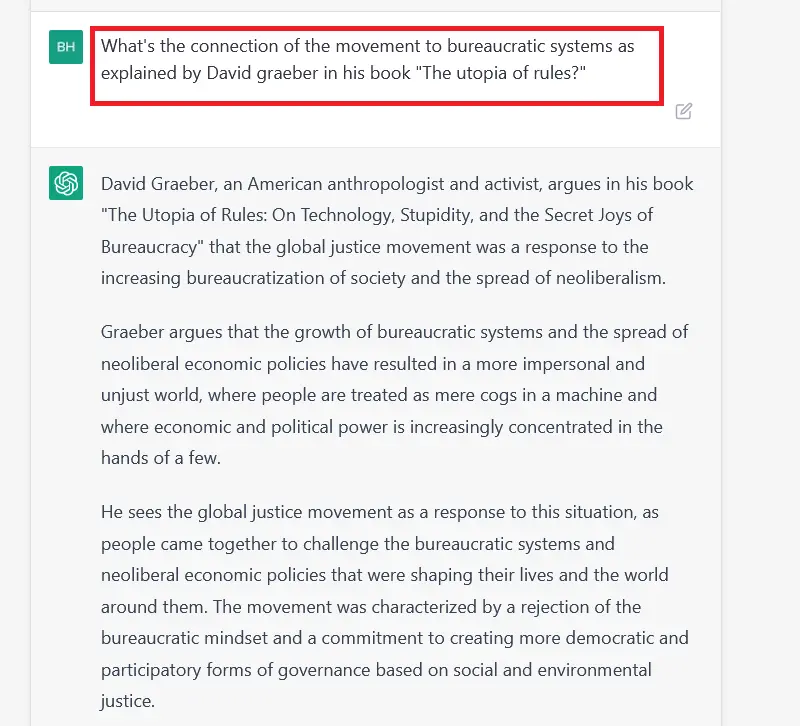When Google announced they were releasing a competitor to ChatGPT and Microsoft’s AI, SEOs worldwide panicked. Lily Ray – a vocal member of the SEO community – has tweeted non-stop about her outrage that Google and Microsoft would “steal” publisher’s content without attribution. After all, most informational websites are in it to make money, usually through advertisements. But if AI gives you a perfect answer by synthesizing public information, then why would anyone visit websites anymore?
Many feel that Google and Microsoft have an ethical obligation to link to citations and sources from other websites. At least publicly, the CEO of Microsoft Satya Nadella seems to agree:
On the search side, I’m very, very clear. The search category is about fair use so that we can generate traffic back to publishers.
Whether this is PR, merely “good intentions”, or an outright fabrication is something to be seen. However, there’s one thing SEOs should realize.
Google and Microsoft do not owe you Citations
Unless the AI bots outright plagiarize your content and replicate it verbatim, they have no legal obligation to cite your website in their sources. AI bots scan the web and synthesize information from multiple sources, and they then present this information with sufficient differentiation to not require a citation. Ask yourself this question:
When you answer a question from a friend, do you surround your words with elaborate citations?
No! This is not how knowledge works. AI is getting to the point where it’s indistinguishable from most human minds. It is human (and often better). Why should we hold AI to standards that humans routinely ignore? AI can do in a matter of seconds what can take a lifetime for a human to synthesize. Just because it’s faster doesn’t mean we should force it to comply with arbitrary rules.
Google Doesn’t Care About Publishers
I must admit that Google has done a great job fooling the SEO community that they care about them and publishers. The venerable, friendly, smiling face of John Mueller and his grandfatherly engagements on Twitter make it appear that Google listens to us and cares about it.
I have bad news for you. Google doesn’t give a shit about publishers like us. They engage with the SEO community for PR reasons and nothing more. John Mueller himself is utterly clueless about what’s happening in search – to the point where he doesn’t even know about major search algorithm updates, confidently stating that none were in the pipeline, only to have a massive update drop the very next day.
And then this happened the very next day:
All this to say that the real Google search team doesn’t even bother to update Mueller on when they’re rolling out a massive core update, never mind sharing the inner workings of search with him. Google’s, and Mueller’s intention for SEOs is not to help them rank better. It’s all PR.
When I realized I could use ChatGPT to generate structured data, I realized how much contempt Google has for us. We’ve wasted tens of thousands of hours writing and debugging structured data as a community. Did Google give us a tool to generate syntax error-free structured data? No! The ChatGPT comes along and does it perfectly!
If Google is to be believed, their internal tools are far more advanced than ChatGPT, so why the hell haven’t they released such a tool for us yet? Instead they wasted our time. It’s hard to describe how much this makes me seethe with indignation. Google is either lazy, incompetent, or indifferent to the struggles of website publishers and SEOs.
ChatGPT and Bard AI Synthesis Can Make Citation Impossible
You can only have a citation when you obtain a fact or an argument from a discrete source. And when you make no inferences of your own, but simply present them “as is”. But the complexity of the questions that ChatGPT can answer demonstrates that finding a citation can be impossible. Here’s an example:

This is a question that is not answered on any single website. Go ahead, type the following query into Google search and see what you get:
What’s the connection of the Global Justice Movement to bureaucratic systems as explained by David Graeber in his book “The utopia of rules?”
Answer: You get nothing. What ChatGPT has done here is equivalent to a Ph.D. referencing multiple sources, synthesizing the answers, making connections, and presenting a wholly original thought. Such answers are impossible to buttress with citations. If anything, the citation should be ChatGPT itself!
ChatGPT can answer infinitely complex long-tailed queries that probably get asked only once in the history of mankind. How do you provide citations for this when no website has the answer?
AI vs Google’s Featured Snippets
I’ve seen some SEOs claim that because Google already uses featured snippets with citations in its search results, it can do the same with Bard. But anyone making this comparison has never used ChatGPT. It’s so much more than a run-of-the-mill featured snippet. Google’s featured snippet is a verbatim replication of a website’s text, so it makes perfect sense to cite the original source – perhaps even for legal reasons.
But what ChatGPT does and what Google’s Bard claim to do is synthesize information, and it’s impossible to cite.
Which Source to Cite?
At least with featured snippets, since Google and Bing are copying words, they can definitively cite a single source. But if you’re presenting a fact you’ve seen on 20 other websites, how do you know which source to cite? The first one to report it? Why is that a criteria?
It’s entirely possible not to know which source to cite.
The Death of Monetized Websites – the Return of Blogs
I don’t think there’s any way around it. Websites whose sole reason for existing is monetization through display ads are on the way out. Affiliate sites that don’t differentiate themselves will die. Coupon sites that hide coupons from their users until they “click” on them will lose out to those who display the whole coupon and might get picked up by AI tools. For example, I have a Hostgator coupon code 2024 page that displays all coupons in plain sight – unlike other sites that hide them. So I believe I will have a competitive advantage going forward.
Blogs and Forums will Thrive
Before the swarm of monetized websites, there was the blog. Personal, thoughtful, and non-SEO oriented. You hardly ever see them these days. But I believe that with AI answering all our questions, the time is ripe for blogs to come back. So will forums, where people want to interact with one another. Other websites will make you sign in to read their content – not necessarily paid.
In short, I think the Internet will look very different from what it looks today with AI. It’s time for SEOs to stop engaging in wishful thinking by believing that Google and Microsoft AI owes them something. The future is staring at you in the face. Accept it.

Speak Your Mind